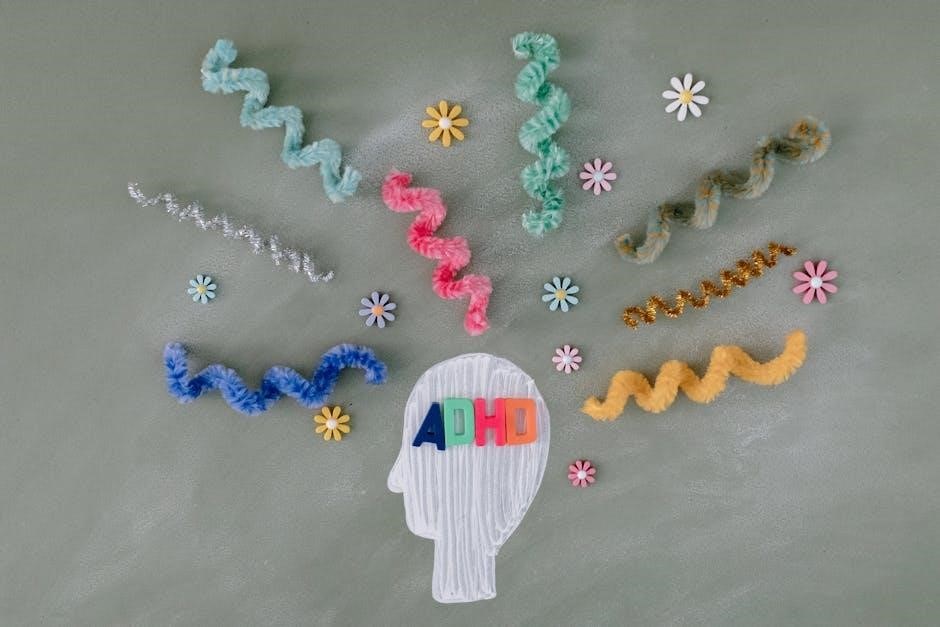David G․ Myers’ Psychology, 12th Edition offers a comprehensive introduction to the field, blending classic theories with modern research․ The textbook is known for its engaging storytelling, modular organization, and practical applications, making it accessible for students․ Co-authored with C․ Nathan DeWall, it incorporates real-life examples and humor to enhance learning․ The 12th edition features updated studies, visual aids, and the SQ3R method to facilitate effective studying․ Available in PDF format, it is widely used in introductory psychology courses and is praised for its balanced and contemporary approach to understanding human behavior․
1․1 Overview of the Textbook
Psychology, 12th Edition by David G․ Myers and C․ Nathan DeWall is a comprehensive introductory psychology textbook․ Organized into 55 short modules, it balances classic theories with cutting-edge research․ The authors use storytelling, humor, and real-life examples to engage students, making complex concepts accessible․ Each module averages 12 pages, minimizing cross-references for easier digestion․ Available in PDF format, the textbook is compatible with multiple devices, catering to modern learning preferences․ Its modular design allows for flexible study, while its evidence-based content ensures a well-rounded understanding of psychological science․ This edition is widely praised for its clarity, depth, and ability to connect psychology to everyday life․
1․2 Authors and Their Contributions
David G․ Myers, a distinguished psychology professor, and C․ Nathan DeWall, a renowned researcher, collaborated on the 12th Edition of Psychology․ Myers, known for his engaging writing style, has authored several best-selling textbooks, making complex psychological concepts accessible․ DeWall brings expertise in social psychology and neuroscience, enhancing the textbook’s depth․ Together, they integrate cutting-edge research, real-life applications, and humor to captivate students․ Their contributions include a modular format, ensuring clarity and ease of understanding․ The textbook’s success lies in their ability to connect psychological theories to everyday life, making it a valuable resource for both students and instructors worldwide․
1․3 Key Features of the 12th Edition
The 12th Edition of Psychology by David G․ Myers and C․ Nathan DeWall features a modular format, dividing content into 55 concise chapters․ This structure allows for focused learning, with each module averaging 12 pages․ The textbook incorporates the SQ3R study method, encouraging active engagement․ It also includes updated research findings, real-life applications, and visual aids to enhance understanding․ The authors’ use of storytelling and humor makes complex concepts relatable․ Additionally, the 12th Edition is available in PDF format, accessible across various devices, ensuring flexibility for modern learners․ These features collectively create an engaging and effective learning experience for students of introductory psychology․

Structure and Content of the Textbook
Psychology, 12th Edition is organized into 55 concise modules, averaging 12 pages each, allowing for focused learning․ The text integrates the SQ3R study method and real-life applications, enhancing comprehension and engagement․
2․1 Organization into Modules
The 12th Edition of Psychology by David G․ Myers is structured into 55 concise modules, each averaging 12 pages․ This modular approach allows students to focus on specific topics without lengthy cross-references, making the content easily digestible․ The organization ensures that each module is self-contained, enabling learners to grasp key concepts independently․ Myers and DeWall use engaging storytelling and humor to present psychological principles, often sharing personal anecdotes to illustrate complex ideas․ This approach fosters a deeper connection with the material, making the textbook both informative and enjoyable for students new to the field of psychology․
2․2 Coverage of Core Psychological Concepts
The 12th Edition of Psychology by David G․ Myers provides a comprehensive overview of core psychological concepts, blending classic theories with contemporary research․ Topics range from neuroscience and biological foundations to sensation, perception, learning, memory, motivation, and emotion․ The textbook also explores developmental psychology, personality theories, psychological disorders, and social psychology․ Myers’ balanced approach ensures that students gain a deep understanding of both historical and modern perspectives․ The inclusion of real-life examples and practical applications makes complex theories relatable and accessible․ This thorough coverage equips students with a solid foundation in introductory psychology, preparing them for further academic pursuits in the field․
2․3 Integration of Research and Real-Life Applications
The 12th Edition of Psychology by David G․ Myers excels in integrating cutting-edge research with practical, real-world applications․ Myers and DeWall use engaging storytelling and personal anecdotes to illustrate how psychological principles apply to everyday life․ From understanding mental health challenges to improving learning strategies, the textbook bridges theory and practice․ The inclusion of SQ3R study methods and visual aids enhances comprehension․ This integration helps students connect abstract concepts to tangible scenarios, fostering a deeper understanding of psychology’s relevance to real-world issues and personal experiences․

Key Topics Covered in the Textbook
The 12th Edition covers core topics like neuroscience, sensation, perception, learning, memory, motivation, emotion, development, personality, psychological disorders, therapy, and social psychology, providing a comprehensive overview․
3․1 Neuroscience and Biological Foundations
The 12th Edition delves into the biological basis of behavior, exploring the structure and function of the brain, neurotransmitters, and the nervous system․ It discusses how genetics, hormones, and the endocrine system influence psychological processes․ The textbook also examines the role of neuroplasticity and the impact of drugs on neural functioning․ Additionally, it covers the latest research on the biological correlates of behaviors, such as sleep, eating, and sexual behavior, providing a foundational understanding of the interplay between biology and psychology․ This section equips students with a solid grasp of the physiological underpinnings of human thought and action․
3․2 Sensation and Perception
The 12th Edition explores how humans detect and interpret sensory information, covering thresholds, sensory pathways, and perceptual principles․ It explains how the brain organizes stimuli into meaningful experiences, discussing vision, hearing, touch, taste, and smell․ The textbook highlights the distinction between sensation (detection) and perception (interpretation), emphasizing how expectations, emotions, and context influence perception․ Myers also delves into perceptual illusions, demonstrating how our brains construct reality․ This section provides a clear understanding of how we interact with and make sense of the world around us, blending scientific research with engaging real-life examples․
3․3 Learning and Memory
The 12th Edition examines the processes of learning and memory, essential for understanding behavior․ It discusses classical conditioning (Pavlov) and operant conditioning (Skinner), explaining how behaviors are acquired․ Memory is explored through models like sensory, short-term, and long-term storage, and the textbook highlights factors influencing memory accuracy, such as emotions and context․ Myers also covers memory distortions and strategies to enhance retention․ The section emphasizes the interplay between cognition and environment, providing insights into how learning shapes who we are and how memory constructs our sense of self․
3․4 Motivation and Emotion
The 12th Edition explores motivation and emotion, examining what drives human behavior and how emotions influence decisions․ It discusses intrinsic (internal) and extrinsic (external) motivators, such as personal satisfaction versus rewards․ The textbook delves into theories of emotion, including the James-Lange theory and the two-factor theory, explaining how biological and cognitive processes interact․ Myers also addresses how emotions like happiness, fear, and anger affect well-being and behavior․ Practical applications, such as strategies to manage stress and enhance motivation, are highlighted, providing readers with tools to apply psychological principles to their daily lives and improve emotional resilience․
3․5 Developmental Psychology
The 12th Edition dedicates a chapter to developmental psychology, exploring human growth and development across the lifespan․ It examines key theories, including Piaget’s cognitive stages and Vygotsky’s sociocultural approach․ The chapter discusses developmental stages from infancy to adulthood, highlighting physical, cognitive, and social changes․ Myers and DeWall address topics like language development, moral reasoning, and identity formation․ They also explore lifespan perspectives, emphasizing continuity and change․ The text incorporates modern research on neuroplasticity and cultural influences, offering a nuanced understanding of human development․ Practical applications, such as strategies for fostering resilience, are included to help readers apply psychological principles to real-life situations․
3․6 Personality Theories
In the 12th Edition, Myers and DeWall present a comprehensive overview of personality theories, focusing on their historical development and contemporary relevance․ The chapter explores psychoanalytic theories, including Freud’s structure of personality, and highlights humanistic approaches like Rogers’ self-actualization and Maslow’s hierarchy of needs․ It also delves into trait theory, led by Allport and the Big Five personality model, and examines behavioral and social learning perspectives, emphasizing Bandura’s role of observation and reinforcement․ The text integrates modern research, such as the impact of culture and genetics on personality, providing a balanced view of how these theories explain individual differences and behavior․
3․7 Psychological Disorders and Therapy
The 12th Edition provides a detailed examination of psychological disorders and therapies․ It covers the classification of mental illnesses using the DSM-5 framework, discussing anxiety, mood, and personality disorders․ The text also explores therapeutic approaches, including psychotherapy, such as cognitive-behavioral and humanistic therapies, and biological treatments like medication and brain stimulation․ Myers emphasizes evidence-based practices and the importance of cultural sensitivity in diagnosis and treatment․ The chapter integrates real-life case studies to illustrate the complexities of mental health, offering students a clear understanding of the challenges and advancements in the field of psychological intervention and care․
3․8 Social Psychology and Interpersonal Relations
The 12th Edition thoroughly explores social psychology and interpersonal relations, examining how individuals think, influence, and relate to one another․ It delves into key topics such as attitudes, persuasion, group dynamics, and prejudice, using real-life examples to illustrate social psychological principles․ The text also addresses interpersonal attraction, social identity, and the impact of social media on relationships․ Myers emphasizes the practical applications of social psychology, such as fostering cooperation and reducing conflict․ By balancing classic theories with contemporary research, the chapter provides a comprehensive understanding of human social behavior and its relevance to everyday life and societal challenges․

Digital Resources and Accessibility
The 12th Edition offers versatile digital resources, including a downloadable PDF version, online study materials, and compatibility across multiple devices, ensuring easy access for modern learners․
4․1 Availability of PDF Versions
The 12th Edition of David G․ Myers’ Psychology is widely available in PDF format, offering students and educators convenient access to the textbook․ Official publishers like Worth Publishers and Macmillan Learning provide digital versions for purchase, while online marketplaces and academic databases also offer access․ The PDF is compatible with multiple devices, ensuring flexibility for learners․ It includes all the textbook’s content, such as modules, visual aids, and study materials, making it an ideal choice for those preferring digital learning․ The PDF version is also easily searchable and portable, enhancing the learning experience for users․
4․2 Online Supplements and Study Materials
The 12th Edition of Psychology by David G․ Myers is accompanied by a wealth of online supplements and study materials․ These include interactive activities, quizzes, and multimedia resources designed to enhance learning․ Instructors can access test banks, PowerPoint slides, and lecture guides to support their teaching․ Students benefit from flashcards, concept maps, and practice tests that reinforce key concepts․ The companion website also features video tutorials and real-world applications, making complex psychological principles more engaging and accessible․ These digital tools provide a comprehensive and interactive learning experience, complementing the textbook’s modular structure and fostering deeper understanding․
4․3 Compatibility with Various Devices
The 12th Edition of Psychology by David G․ Myers is designed to be accessible across multiple devices, ensuring flexibility for students․ The PDF version is compatible with laptops, tablets, and smartphones, allowing seamless access to content․ The digital format is optimized for readability on different screen sizes, maintaining clarity and layout․ This compatibility enables students to study anywhere, whether commuting, in class, or at home․ The eBook also supports interactive features, such as highlighting and note-taking, on most devices․ Additionally, offline access ensures that learning materials remain available even without internet connectivity, making it a convenient resource for modern learners․
Teaching and Learning Strategies
The 12th Edition incorporates active learning techniques, visual aids, and the SQ3R method to enhance engagement and retention․ These strategies help students interact with content effectively, fostering deeper understanding and application of psychological concepts․
5․1 Active Learning Techniques
The 12th Edition employs active learning techniques to engage students, fostering participation and critical thinking․ Interactive exercises, real-world examples, and thought-provoking questions encourage hands-on application of concepts․ The modular format allows for bite-sized learning, making complex topics manageable․ Myers and DeWall incorporate personal anecdotes and humor to create a relatable and immersive experience․ Students are prompted to reflect on their own experiences, connecting psychological principles to everyday life․ This approach not only enhances comprehension but also motivates students to explore psychology with curiosity and enthusiasm, preparing them for practical application in various fields․
5․2 Use of Visual Aids and Illustrations
The 12th Edition incorporates a wide range of visual aids, including diagrams, charts, and photographs, to enhance understanding․ These illustrations complement the text by breaking down complex concepts into visually engaging formats․ Brain scans, neural pathways, and statistical graphs are presented clearly, aiding students in grasping difficult topics․ The modular design integrates images seamlessly, ensuring each module is self-contained and visually appealing․ This approach helps students connect theoretical knowledge with practical examples, making the material more accessible and memorable․ The use of visual aids aligns with the SQ3R method, encouraging students to survey images and headings before diving into the content․
5․3 SQ3R Method for Effective Studying
The 12th Edition incorporates the SQ3R method, a proven study technique, to enhance learning․ SQ3R stands for Survey, Question, Read, Retrieve, and Review․ Students are encouraged to survey each module by skimming headings and visuals, then generate questions based on these elements․ While reading, they answer these questions, retrieve key information through self-quizzing, and review the material to reinforce understanding․ This method, integrated into the textbook’s structure, promotes active engagement and critical thinking․ By aligning with how the brain processes information, SQ3R helps students master psychological concepts efficiently, making the learning experience both interactive and impactful․
Comparison with Previous Editions
The 12th Edition of Myers’ Psychology builds on earlier versions, incorporating new research and enhanced digital tools․ It differs from the 11th Edition by updated content and expanded multimedia resources, while the 13th Edition introduced additional interactive features, making the 12th Edition a transitional but still valuable resource for students․
6․1 Updates in the 12th Edition
The 12th Edition of Myers’ Psychology includes updated research findings, expanded coverage of neuroscience, and enhanced digital resources․ New modules focus on contemporary topics like the impact of technology on behavior and mental health․ The SQ3R study system has been refined to improve retention, and visual aids have been modernized․ Additionally, the textbook incorporates more real-life applications, making psychological concepts relatable․ The 12th Edition also introduces interactive online supplements, providing students with a more immersive learning experience․ These updates ensure the textbook remains a cutting-edge resource for introductory psychology courses, blending scientific rigor with engaging presentation․
6․2 Differences from the 13th Edition
The 13th Edition of Myers’ Psychology includes additional updates and expansions compared to the 12th Edition․ It features new research findings, enhanced digital resources, and expanded coverage of emerging topics like neuroscience and technology’s impact on behavior․ The 13th Edition also introduces more interactive online supplements and improved visual aids․ While the 12th Edition remains a robust resource, the 13th Edition offers the latest advancements in psychological science․ The 12th Edition PDF is still widely available, but the 13th Edition provides a more comprehensive and up-to-date learning experience for students of introductory psychology․
6․3 Evolution of Content Over Editions
Each edition of Myers’ Psychology reflects the evolving nature of psychological science․ The 12th Edition incorporates cutting-edge research and modern teaching methods, building on the foundation laid by earlier versions․ Over time, the textbook has expanded its coverage of neuroscience, cognition, and cultural psychology, while maintaining its engaging storytelling style․ The modular format, introduced in earlier editions, has been refined for better clarity and accessibility․ The 12th Edition also emphasizes real-life applications and critical thinking, ensuring students connect theoretical concepts with everyday experiences․ This evolution underscores the textbook’s commitment to providing a comprehensive, up-to-date introduction to the field of psychology․

Reception and Reviews
Psychology, 12th Edition by David G․ Myers has received widespread acclaim for its engaging storytelling, real-life examples, and balanced coverage of psychological concepts․ The modular format enhances readability, while the PDF version ensures accessibility across devices, making it a favorite among students and instructors alike․
7․1 Academic Community Feedback
The academic community has praised Psychology, 12th Edition for its comprehensive coverage of psychological concepts․ Researchers and educators highlight its clarity, engaging storytelling, and integration of cutting-edge research․ The modular format is particularly commended for enhancing student understanding․ Instructors appreciate how the text connects theory to real-world applications, fostering critical thinking․ The PDF version’s accessibility across devices has also been lauded, supporting modern learning preferences․ Overall, the textbook is widely regarded as a valuable resource for introductory psychology courses, balancing depth and readability to cater to diverse learning needs effectively․ Its reputation as a trusted educational tool continues to grow․
7․2 Student Reviews and Ratings
Students widely praise the Psychology, 12th Edition for its engaging and accessible format․ Many appreciate the modular structure, which breaks complex concepts into digestible sections․ The integration of humor and real-life examples makes the material relatable and interesting․ The PDF version is particularly popular for its convenience and accessibility across devices․ Ratings highlight the textbook’s clarity and effectiveness in preparing for exams․ Overall, students find it a valuable resource for understanding psychology, with many recommending it for its balanced blend of theory and practical applications․ Its user-friendly design enhances the learning experience, making it a favorite among undergraduates․
7․4 Comparison with Other Psychology Textbooks
․ While others may focus more on theoretical aspects, Myers incorporates practical applications and storytelling, making complex concepts relatable․ The PDF version’s portability and affordability enhance its appeal, setting it apart in a competitive market․ Students and instructors often prefer it for its clarity, humor, and ability to connect psychology to everyday life, distinguishing it from alternative texts․
Where to Access the PDF
The PDF of Psychology, 12th Edition by David G․ Myers is available through official publishers, academic databases, and online marketplaces like Amazon, Google Books, and JSTOR․
8․1 Official Publishers and Retailers
The PDF version of Psychology, 12th Edition by David G․ Myers can be purchased directly from official publishers like Worth Publishers and Macmillan Learning․ Retailers such as Amazon, Barnes & Noble, and Google Books also offer digital copies․ These platforms ensure authenticity and provide immediate access after purchase․ Additionally, many college bookstores and online marketplaces like Chegg and VitalSource offer e-textbooks for rental or purchase․ Buying from these sources guarantees a high-quality, legally compliant version of the textbook, supporting both students and the authors․
8․2 Academic Databases and Libraries
Academic databases and libraries often provide access to digital versions of Psychology, 12th Edition․ Platforms like JSTOR, ProQuest, and EBSCOhost may offer the PDF through institutional subscriptions․ Many university libraries also provide access to e-textbooks like Myers’ Psychology via their online collections․ Services like OverDrive and RedShelf are commonly used by libraries to distribute digital materials․ Additionally, platforms such as Cengage Learning and Scribd may host the PDF for academic use․ Access typically requires a valid university login or subscription, ensuring compliance with copyright and licensing agreements․
8․3 Online Marketplaces and Direct Purchases
Online marketplaces like Amazon and eBay offer the PDF version of Psychology, 12th Edition for purchase․ Direct purchases can also be made through Barnes & Noble and other online retailers․ Some platforms provide instant downloads after payment, ensuring quick access to the textbook․ Additionally, websites like Book Depository and VitalSource may offer e-book versions․ It’s important to verify the seller’s credibility to ensure authenticity․ Some online marketplaces may also feature free PDF downloads, though users should exercise caution to avoid unauthorized or illegal sources․ Always opt for reputable sellers or official publishers to comply with copyright laws․
Psychology, 12th Edition by David G․ Myers is a trusted resource for understanding psychological science․ Its engaging approach, real-life applications, and modular design make it invaluable for students and educators alike․
9․1 Summary of Key Features
Psychology, 12th Edition by David G․ Myers offers a modular approach with 55 short chapters, making complex concepts accessible․ It integrates the SQ3R study method, promoting active learning through Survey, Question, Read, Retrieve, and Review․ The text includes engaging storytelling, humor, and real-life examples, enhancing student engagement․ Updated research and practical applications ensure relevance to contemporary issues․ Visual aids and illustrations support visual learners, while the PDF format is compatible with multiple devices, offering flexibility; The balanced coverage of classic theories and modern findings provides a comprehensive understanding of psychology, making it an invaluable resource for introductory courses․
9․2 Final Thoughts on the Textbook’s Value
Psychology, 12th Edition by David G․ Myers is a highly regarded textbook that effectively introduces students to the science of psychology․ Its engaging storytelling, humor, and real-life examples make complex concepts accessible and interesting․ The modular format and SQ3R method enhance learning, while updated research ensures relevance․ This textbook is widely praised for its balance of classic theories and contemporary findings, making it an invaluable resource for introductory psychology courses․ Its accessibility in PDF format and compatibility with various devices further add to its value, ensuring students can learn anytime, anywhere․
